Cockatiels, with their vibrant plumage and cheerful disposition, have captured the hearts of pet enthusiasts around the world. These beloved avian companions can bring joy and companionship for up to two decades or more, provided they receive the proper care and attention they deserve.
However, like any living creature, cockatiels are susceptible to illness and require vigilant monitoring to ensure their well-being. Recognizing the signs of a sick cockatiel is crucial in order to provide timely treatment and support.
In this article, we will explore how to identify indicators of illness in cockatiels, discuss common diseases that can affect them, and provide essential guidelines for caring for these feathered friends in the comfort of your own home.
By familiarizing ourselves with these important aspects, we can ensure a long and healthy life for our cherished cockatiel companions.
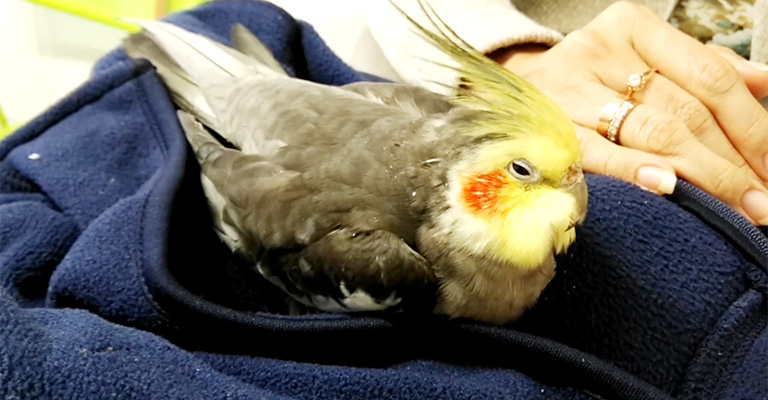
Signs of a Sick Cockatiel
Cockatiels are good at hiding their illness from their owners and other birds. They do this as a survival instinct since showing weakness can make them vulnerable to predators or rivals in the wild. Therefore, observing your cockatiel closely and regularly and comparing its behaviour and appearance with its normal state is essential.
Some signs of a sick cockatiel include:
Changes in Appetite and Drinking Habits
A sick cockatiel may eat and drink less or more than usual or show no interest in its favourite foods. It may also help you lose weight or become overweight.
Changes in Droppings
A sick cockatiel may have abnormal droppings that are watery, discoloured, bloody, or contain undigested food. The droppings may smell foul or stick to the feathers around the vent.
Changes in Behaviour and Activity Level
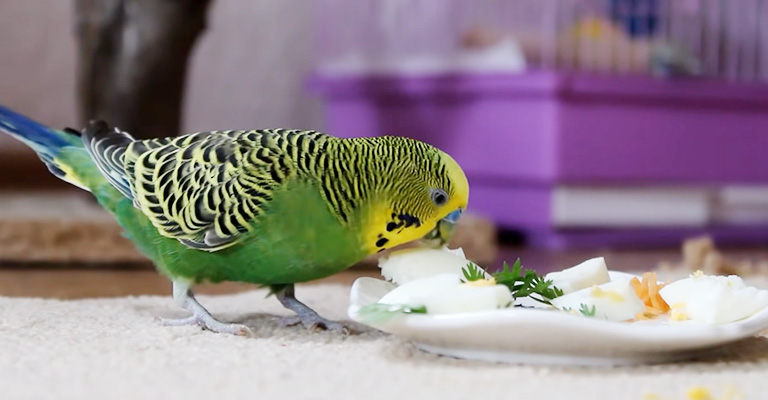
A sick cockatiel may become less active, playful, vocal, or social. It may sleep more or less than usual or with its head tucked under its wing or on the bottom of the cage. It may also show signs of depression, aggression, anxiety, or stress.
Changes in Appearance and Posture
A sick cockatiel may look dull, fluffed, or ruffled. It may have dirty or matted feathers or lose feathers excessively. It may also have swollen or sunken eyes, discharge from the eyes or nostrils, breathing difficulties, sneezing, coughing, wheezing, or panting. It may also hold its wings drooped or away from the body or have trouble standing or balancing.
Suppose you notice any of these signs in your cockatiel. In that case, you should take it to an avian veterinarian as soon as possible for diagnosis and treatment. Some diseases can be fatal if left untreated, and others can spread to other birds or humans.
10 Simple Tips: How To Care For A Sick Cockatiel At Home?
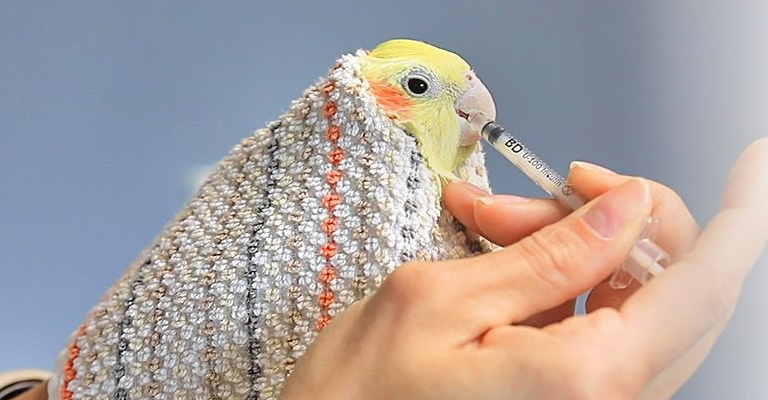
Caring for a sick cockatiel at home requires special attention and diligence. Here are some points to consider, along with broad explanations:
Observe And Monitor
Keep a close eye on your sick cockatiel’s behaviour, appearance, and overall condition. Look for changes in appetite, energy levels, droppings, breathing patterns, or physical abnormalities. This will help you assess the severity of the illness and determine whether immediate veterinary attention is required.
Quarantine
If you have multiple birds, isolate the sick cockatiel in a separate cage or area to prevent the potential spread of disease to other birds. This helps protect the well-being of the other avian companions and allows for focused care for the sick bird.
Create A Comfortable Environment
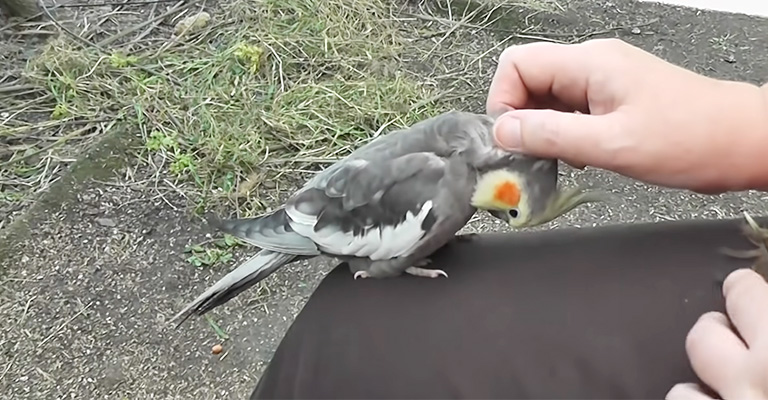
Provide a warm and quiet environment for your sick cockatiel. Maintain a consistent temperature between 75-80°F (24-27°C) and ensure the bird can access fresh air without drafts. Use a soft light source to avoid causing additional stress.
Encourage Rest And Minimize Stress
Minimize noise, handling, and any other sources of stress that could further compromise your bird’s health. Allow the cockatiel to rest undisturbed, providing a calm and peaceful atmosphere for recovery.
Maintain Proper Nutrition And Hydration
Offer a balanced diet of fresh fruits, vegetables, high-quality pellets, and seeds appropriate for cockatiels. If the bird’s appetite is reduced, provide easily digestible foods like baby food or hand-feeding formula recommended by a veterinarian. Ensure a clean and fresh water supply at all times.
Medication And Treatment
Administer any prescribed medications or treatments as directed by a qualified avian veterinarian. Follow the instructions carefully, including dosage, frequency, and duration of treatment. Be patient, as it may take time for the bird to respond to the medication.
Humidity And Steam Therapy
Increasing humidity or providing steam therapy may benefit respiratory issues depending on the underlying condition. Consult your avian veterinarian for specific recommendations on humidity levels or steam therapy techniques.
Maintain Cleanliness
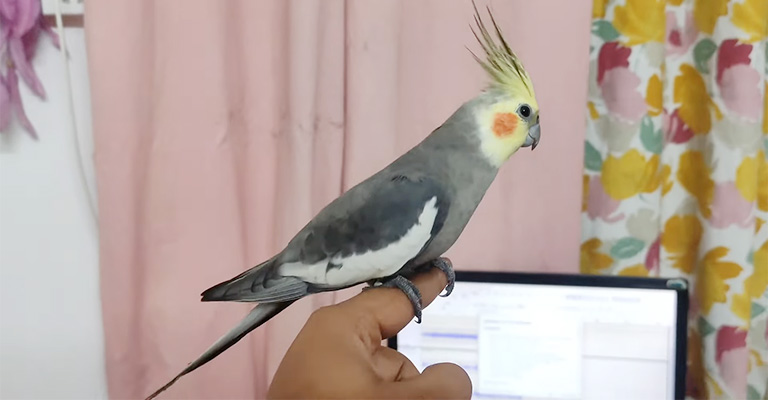
Clean the cage and perches regularly to prevent the buildup of bacteria or fungi. Use safe avian disinfectants your veterinarian recommends to ensure proper hygiene without harming your bird.
Offer Emotional Support
Cockatiels are social creatures who may benefit from gentle interaction and reassurance during recovery. Spend time near the bird’s cage, speak softly, and offer comforting sounds. However, be mindful of not overexerting the bird and causing unnecessary stress.
Regular Follow-Up With A Veterinarian
Keep your bird’s veterinarian informed about its progress and follow any recommended follow-up appointments. A professional’s guidance is crucial for assessing the bird’s condition, adjusting treatment, or providing additional care instructions.
FAQ
You can tell if your cockatiel is sick by observing its behaviour and appearance and comparing them with its normal state. Some signs of an ill cockatiel include changes in appetite, droppings, activity level, vocalisation, sleep pattern, posture, and feather condition. If you notice these signs, immediately take your cockatiel to an avian veterinarian.
Psittacosis is a severe and potentially fatal disease that can affect cockatiels and other birds. The survival rate of a cockatiel with psittacosis depends on several factors, such as the severity of the infection, the age and health of the bird, and the timeliness and effectiveness of the treatment. A cockatiel with psittacosis can recover if diagnosed and treated early, within a few weeks to months. However, if left untreated or treated late, a cockatiel with psittacosis can die within days to weeks.
AGY is a common yeast infection that can affect the digestive system of cockatiels and other birds. The most apparent sign of AGY is vomiting or regurgitation of food or mucus. Other symptoms include diarrhoea, weight loss, dehydration, lethargy, and depression. If you suspect your cockatiel has AGY, you should take it to an avian veterinarian for diagnosis and treatment.
BFD is a viral infection that can affect the immune system of cockatiels and other birds. It can cause feather loss, beak deformities, skin lesions, anaemia, and death. There is no specific treatment for BFD, but supportive care and prevention are essential. Some cockatiels may recover from BFD if they have a robust immune system and receive proper care.
You can prevent your cockatiel from getting sick by providing a healthy and happy environment. This includes a balanced diet, clean water, a spacious cage, enriching toys, regular exercise, and social interaction.
You should also avoid exposing your cockatiel to potential hazards such as toxic plants, chemicals, smoke, drafts, extreme temperatures, or predators.
Conclusion
Being aware of the signs of illness in cockatiels and understanding common diseases that can affect them is essential for providing proper care and attention to our beloved pets.
By promptly recognizing symptoms and seeking guidance from avian veterinarians, we can ensure the best possible treatment for our cockatiels.
Additionally, following the veterinarian’s instructions diligently and providing a comfortable and nurturing environment at home can aid in the recovery process and contribute to the long and happy life of our feathered companions.
Remember, the health and well-being of our cockatiels should always be a top priority, and seeking professional veterinary care is crucial for their overall welfare.